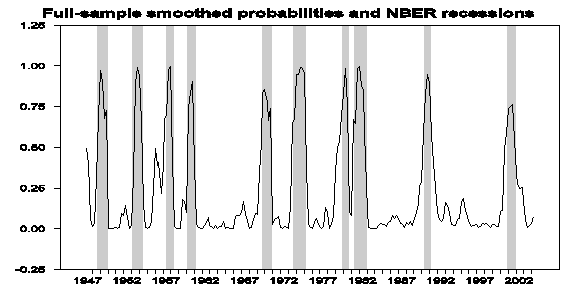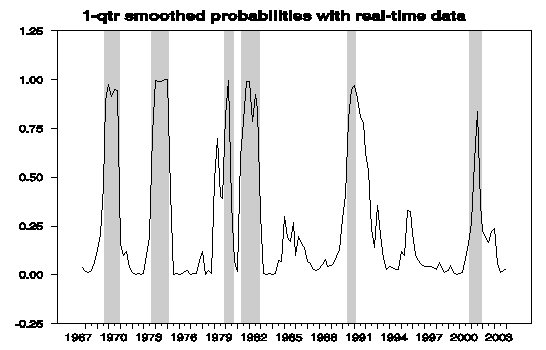Thanks much to Menzie for holding down the fort while I was away last week. Now that I’m back, I’d like to weigh in on the issue of when did the recession of 2001 begin, a topic on which Menzie, Greg Mankiw, Steve Verdon, Michael Mandel, and Brad DeLong all commented last week.
One of my research interests has been using automated pattern-recognition algorithms to try to identify business cycle turning points. One arrives at slightly different dates depending on the data set to which one applies such an approach. One option is to use just a single series, such as real GDP growth, on the argument that this single number already aggregates much of what we’re interested in for purposes of characterizing the overall level of economic activity. An alternative is to rely on a number of different indicators, hoping to recognize a downturn on the basis of a common movement across different indicators. There are strengths and weaknesses of either approach. GDP is only available quarterly, so using multiple monthly indicators may provide a more timely signal. On the other hand, there is more noise in each individual monthly variable, and changes in factors such as the labor force participation rate can make it hard to know how to relate current values of job growth to the patterns that have been observed historically. I expect the GDP approach may be a little more robust, and the recession probability index that Econbrowser regularly reports is based on GDP alone.
In addition to the question of which variable one uses, there is a separate question as to whether one is allowed to make use of revisions to the data that occur over time, which, as Menzie has elsewhere noted, can be quite substantial; (see also Dean Croushore’s recent research). Obviously if automated pattern-recognition is going to be helpful in recognizing currently developing trends, we’re forced to rely on the data as they are available in real time, even though we know there may be substantial revisions to those numbers coming later.
In a recent paper with Marcelle Chauvet, I looked at this question with four different types of data sets– the historical GDP series as it is reported today, the “real-time” GDP numbers as they would have been reported by the Commerce Department at any given historical date, a set of four key monthly indicators as they are reported today, and those same indicators as available real-time historically. The paper reports four sets of business cycle dates, corresponding to these four different types of data sets.
For purposes of the question originally raised by Mankiw, namely, when did the recession of 2001 begin, it seems to me the most useful approach is to use all of the information that is currently available. For GDP data, these inferences are reported in Table 2 of my paper with Chauvet, which concludes that the recession began in 2000:Q4, and in Table 6 based on monthly indicators, which concludes that the recession began in September 2000. Thus, if you let me use all the information that is available today, I would come down clearly in Mankiw’s corner on this debate– the recession began late in the year 2000.

A second question is, what call would you have made if you only had the data as reported at the time? For this purpose, the data revisions are a big enough concern that Marcelle and I recommend not trying to make a call until one has three months’ worth of revisions. Conscientious Econbrowser readers will note that the most recent recession probability index reported by Econbrowser is actually for 2006:Q1, and data revisions are one reason for that delay. Our research paper finds that if you give yourself a 3-month delay before trying to make a call, we can still make a pretty reliable inference. The real-time (i.e., 3-month delay) conclusion using monthly data (reported in Table 8) dates the start of the recession as March 2001, and this is the number earlier highlighted by Menzie. Menzie also notes that a separate paper by Piger and Chauvet also often finds a later start date for the recession if one is forced to rely on data as they were released at the time rather than all the data we have available today.

I suppose that part of the interest in this question may be that, if the recession started in 2000, one could “blame” the recession on Clinton, whereas if it started in March 2001, some partisans would instead call it the “Bush Recession.” Let me offer my own two cents on that controversy as well. My view is that presidents (and, in state politics, governors) receive more credit than they deserve when the economy does well, and more blame than they deserve when the economy does poorly. Much of what happens to the economy is shaped by forces beyond the control of any governor or president, such as the world price of oil and the pace of technological innovation and acquisition. To the extent that policy makes a contribution, monetary policy operates with a long lag, and often responds to forces that have been in play for many years earlier. For example, most of us would agree that the slowdown in inflation in the 1980s (for which President Reagan is sometimes credited) was due to Fed Chair Paul Volcker, who was in fact appointed by President Carter. Moreover, the primary reason that Volcker was able to bring inflation down was his willingness to contribute to an economic recession in 1980, for which Carter was blamed. Perhaps the real error was allowing inflation to accelerate as much as it did prior to Volcker, for which much of the blame would logically go to Fed Chair Arthur Burns, appointed by President Nixon in 1970, and G. William Miller, Carter’s pick in 1978. But even here there is a separate interesting question as to the contribution that bad real-time data may have made to those policy errors.
In any case, to the extent that there are those who would interpret the dating of the start of the 2001 recession as having political implications, or who might question the possible political motivations of anyone who makes a declaration on this topic, that seems to me to be an argument that strongly favors the use of automated and objective data-based algorithms for assigning business cycle dates.
Technorati Tags: macroeconomics,
recession
Dr. Hamilton:
Welcome back and great note. Thank you. I especially enjoyed the end where you commented on different administrations trying to take credit for their immediate policies while in office. With the lagged impact of rate increases, trade policies, investment spending, housing activity in response to rate changes, and a plethora of other macro data and changes, it seems to me that it is very difficult to isolate any party’s short-term decision making to an immediate impact on the economy except for say the expectational effect an unexpected rate cut or increase has on asset prices for a particular trading day or short-term period.
A former Political Poli Sci professor once commented that before polticians get into office they promise a world of change and a ‘new’ outlook or country with their administration only to find out that they are excessively bound by past policy decisions once they take office. Accordingly, it seems to me that according to the polls at least, politicians are measured simply on their popularity and interactions with the public. I seldom hear presidential debates discuss tooth and nail economic policy and platforms but instead are derailed by unnecessary personal criticisms that seems to have given rise to a very critical personal perspective that to my mind takes the focus off of necessary policy making to get the “entire” economy stimulated, not simply select areas for select people. That is, it is an interesting fact that the majority of equity ownership is held in less than 10 percent of the wealthiest US households and that their incomes and assets have grown significantly over the past several decades while real incomes and wealth levels among the majority have declined.
Thus, it seems to me that part of the political cycle, and the policies that it includes, should be aimed towards stimulating real per capita income and asset growth for the entire economy and then and only then can an administration stand back years after a term and take credit for creating a more prosperous America for all and also shift the poltical focus off of personal criticisms and points of view that take away and do not add to economic prosperity.
I think that we as a global economy can do much better if we choose to work towards achieving a higher standard of living everywhere for everyone and allocate fewer resources to unproductive polices and activities that aim to self a small representation of the economy. To my mind, good leadership is selfless leadership that aims to serve those responsible for providing the opportunity to lead and the world today is certainty in need of such leadership….
Hey Professor, looks like we have similar views. Me a greedy capitalist, and you an academic – imagine that! I enjoy your site and appreciate the quality of your analysis and comments. Here is my post to Mandel’s blog last night:
If the point of the timing exercise is about who was more precise – then what a waste of time to discuss it. A few months are meaningless.
If the point is to tie the recession to a particular president, then it is also a waste because economic turns follow policy by very long lags. Using March of 2001, or any prior date, the seeds of that recession were sown long before the 2000 election.
The truth is that the first year of a new president’s term is really just a continuation of the prior president’s budget. Any impact from a new budget will have no real effect until at least another six months after that.
However, I think people give far too much credit (and blame) to presidents for the economic conditions.
Learning About Rational Expectations Solutions
This paper by Bennett McCallum concerns the work of a colleague, George Evans, on the least-squares learnability of rational expectations solutions. Rational expectations models require agents to understand how to calculate the solution to the model, b…
The inflation of the 1970s was due to the floating of the dollar by the Nixon administration, allowing the inflation that had been building in previous administrations to manifest itself. If you want to blame a President for the past 30 years Nixon is your man.
The recession in the 1980s was not cured by Volker but created by Volker. You could say that it was cured by the Mexican Peso crisis.
Inflation is still a problem because there are many pressures leading to the relaxation of the money supply, and as Bernanke has admitted the FED doesn’t know what it is doing so it often simply adds to the disturbance.
It is interesting how the fit of the recession probability predictors seems to be decreasing, most pronounced after the mid-90s (i.e. applying to the 2000/2001 recession). I wonder: is the probability of the next recession being low-balled as much or more?
Hypothesis: the answer is yes, because of some effect of excess liquidity/credit being counted as GDP.
In a sense, its a wonder we’re counting anything as a recession at all. If the last “recovery” was jobless, did that recession ever really end? Does it really all come down to this monolithic metric of GDP?
Talk is Cheap, But Is It Informative?
Jeremy Piger reviews research on the reaction of financial markets to non-quantitative written and oral Fed communications, and, separately, provides estimates of recession probabilities for the U.S.: Is All That Talk Just Noise?, by Jeremy Piger, Mone…